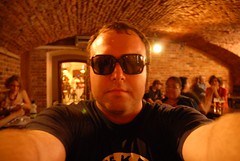There's a feeling of helplessness as the camera pans and tightens on Said's (Kais Nashef) eyes in the last frames of the film. You want so very much to prevent the inevitable but his eyes, his very fierce eyes might as well lull you into complacency as you're split into the part of you that agrees and accepts and the other part that is balanced with horror and is preparing to mourn.
Is Paradise now a call for peace? Perhaps, there's the voice of Suha who advocates other forms of resistance, she's the rational one. There's Said who has a hidden past that seems to foment his actions and there's Khaled (Ali Suliman), the hot-head, the one you're sure will be dependable right until the end. But Khaled's dependability is ultimately at question in this film as he's the character hat has the greatest change of heart or turn around. Its this turn of heart makes me question the believability of this film. Can it really happen like that? Someone who has pledged to be a human weapon, resolving to carry out an operation of martyrdom, sees that there are other options?
I really want to believe this is possible, but the conversion is too fast and too easy. I don't see where there's a real problem with what he has chosen to do and a kind of realization of what one isn't supposed to do. There's a heated conversation with Suha, the daughter of a respected resistance fighter, who is for the cause, but not the actions of her countrymen. She believes in a war of morals, one where the Palestinians have to stop the violence, so that there's never a justification for Israeli violence and then let the battle be an ideological one where the world will see the Palestinian cause as grounded in a peaceful effort toward coexistance. Her strongest argument, the one that if I suspend my doubt as to her effectiveness in changing Khaled's mind, is the question of "what about us, the ones you leave behind? what are we to do?" This question about the martyr's families, the survivors, the women who have historically born the brunt on the homefront of any armed conflit, resistance or offensive, is poignant. It is asking Khaled to step outside himself, to see a picture that is larger than his narrow view of the world and ultimately, his narcissism about paradise.
"What will happen after?" asks Khaled as he rides in a car toward the launch point of his mission "two angels come down and bring you up to paradise" answeres Jamal. "Really?" asks Khaled with a certain tinge of uncertainty. That uncertainty is ultimately his undoing, but it seems that its minor as Jamal explains it away as 'of course' in his very certain and religiously dogmatic attitude.
Both Khaled & Said's features and acting are excellent, but its the women that steal this show. Said's mother played by Hiam Abass and Suha, Lubna Azabal, are marvelous in their ability to let silence speak volumes. Hiam has a small part, something, fleeting, but in those moments she eats up the screen with the simple and quotidian act of preparing a dinner, and later, talking to her son. There's a part of you that very much wants to sit at this woman's table as she chops fresh vegetables for mezedes and hands it to Said to be carried out for the family to eat.
You can eat this piece alive as you watch the struggle, as you cry out in silence hoping to change what you know has a trajectory and life of its own, or you can sit back and wonder if this kind of moral drama does play out, or if the decision to kill yourself and other people along with you is an easy one to make and that the ritual around the martyr is nothing more than window-dressing for a factory operation called suicide bombing.
Sunday, April 16, 2006
Subscribe to:
Post Comments (Atom)




No comments:
Post a Comment